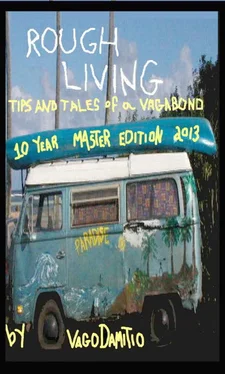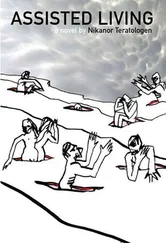Taking-you steal the tobacco from a person or a store.
The Types of Tramping
Like most vocations, there are a number of different ways to tramp or vagabond. Your needs are going to be different depending on where you are and what you spend your time doing. Like everything else we will talk about in this book. It’s a matter of personal preference.
Tropical Tramping is my preferred mode of rough living. The thing I like about it is the warmth of the water, the lack of necessary gear, and the variety of activities. Beach bums are what most of tropical tramps are called. It sounds almost respectable, doesn’t it?
Temperate Tramping is pretty good. You have to do a little more preparing to tramp in a temperate area. You need a way to keep dry. For both you and your gear. You probably need blankets at night. You are going to have a little tougher time finding a place to bathe. It’s all doable. It just requires a little more work.
Cold Weather Tramps work too hard in my opinion. Cold weather tramps have to have a shelter (or else they have to be tougher than they are crazy!) They need to have plenty of gear. They need to have fire on a regular basis. They need to eat enough calories to keep the body going strong. Again, it can be done, but why do it the hard way if you don’t have to.
Packing Heavy vs. Packing Light
When I first started living this way, I moved from a house into a VW bus. I tried to get rid of things but there was so much that I felt necessary to my existence, I wasn’t very successful. I had three pots, two pans, a cheese grater, soup ladles, four sets of silverware (in case I had guests), plates, cups, folding chairs, books, books, and more books, framed pictures, knickknacks on the dash, art supplies, computer gadgets, a guitar, a fiddle, a harmonica, three different size packs, three pillows, four sets of sheets, ten changes of clothing, six sets of shoes, a dog, the dog’s toys, the dog’s pack, the dog’s food, my food, electric razor, seven blankets, a camp stove, a backpacking stove, an icebox, an electric heater, auto tools, woodworking tools, metal tools, knickknacks, toiletries, and about fifty thousand other things. It all went in the car. It was an ordeal each night to clear out a place to sleep. Sometimes, I slept on top of things rather than move them at night so I could sleep and then move them back in the morning so I could drive.
The upside was I had everything I could possibly need or want. I would visit friends and they would be amazed when they would off-handedly say “It’s too bad we don’t have a croquet set!”and I would pull one out of my bus. Or when I made breakfast in the bus for a couple of friends and it turned out to be gourmet omelets with bacon, toast, and hot coffee. I made it in the parking lot of the radio station I worked at for my coworkers. They were surprised as hell at my gourmet kitchen on wheels! It was fun, but what a pain in the ass.
Let’s look at the merits of packing light vs. packing heavy.
Packing Light
Plenty of space
Easy to move
Not obvious
Limited functionality
Requires creativity
Packing Heavy
Variety of Goods means lots of functionality
Takes lots of space
Looks obviously houseless
Hard to move
Limits your mobility
There are plenty of ways to get rid of the extra stuff. If you have furniture and brick-a-brac you can call a second hand junk dealer and have them come pick it up and give you a few bucks for it. This is assuming you still have a house, otherwise you can drop it off. They don’t pay much, but it’s certainly better than carting all that stuff around, right?
Maybe you would feel better donating it to charity. You can drop off just about anything with the Salvation Army, Goodwill, and local thrift stores. Community Services for the Blind will pick things up at your house.
Maybe you have a bunch of things that hold family value. My advice is give that stuff to your family that has space for it. Either give it, loan it, or ask to store a few boxes of ‘grandma’s china’ in Cousin Eldon’s basement.
This brings us to storage. I used to keep a $20 a month storage unit. I have a few things I eventually want to hang on walls when I have some. I have a few family heirlooms and a few things that are too valuable to me to get rid of. Storage is a good option if you find yourself in a similar situation. I prefer paying for storage to keeping things at a friend or relative’s house because I know that my storage unit isn’t going to move, I’m the only one with access to it (because Cousin Eldon’s kids might not know it’s grandmas china and use it for slingshot practice), and because it’s one less thing to think about.
For those who want to have the most options in mobility, packing light wins. For those who want to have the most options in a sedantary life, having a lot of stuff is cool. I admit it, I still carry around too much stuff but my list is smaller now than that huge one above. My vagabond kit these days is a wool coat, a leather bag with a change of clothes, sarong, swim trunks, my laptop, chargers, notebook, sewing kit, identification, and phone. If I won’t be flying anywhere, I bring my Swiss Army Knife. I have a metal coffee cup with a lid and a French Press attachment that I made which comes where I’m not sure there will be cheap coffee.
The rest of it goes in storage somewhere. Here is my list from living in a van in Hawaii. One burner stove, mess kit, coffee cup, food, blanket, knife, sleep pad, hammock, duffel bag of clothes, running shoes, flip flops, guitar, tennis racket, LED light, journal, and a couple of books. I also had a walkman radio and a couple of cheap tools to work on the car.
The key is this. If you carry something for a couple of weeks and you don’t use it at all. Get rid of it.
HOME WHEN YOU DON’T HAVE ONE
You’ve gotta sleep somewhere. Vagabonds develop a knack for having a secure place to sleep. There are a few key things to look for when you’re seeking shelter. A good shelter protects you from the elements. It keeps your gear dry. It keeps your gear from going into some other hobo’s hands. Most importantly, it protects you from the human predators are definitely out there.
Here are a few ideas about camping to get you started:
If you plan to camp, you need to have a decent brown or green tarp. Whether you use it as your shelter, a groundcloth, or to sleep in, you will find it to be $10 very well spent. I maintained a camp in the woods behind a park in Bellingham, Washington for almost a year with no one stumbling on it. I even challenged a couple of friends to go back and find it and none of them could.
BLM and conservation land in the west are readily available for free camping although the laws are getting tighter year by year. There are also still some primitive campgrounds in National and State Forests (cheap or free). National Forests, in most areas, still allow dispersed (non-campground) camping with varying restrictions.
Another camping opportunity in the Mid-West and East, are Army Corps of Engineering sites. Some are very well developed and not too pricey if they have a cost at all.
Department of Wildlife areas in Washington State are set aside for hunting. Pretty neat for camping when out of hunting season. Many of the timber companies set aside areas for recreation too. There is a electric company in Ohio that set up camping areas. All you need is a permit, which you get on-line. Very nice and free!
In the Southwest, land is often unclaimed or government owned. If you’re there, I recommend the Mogollon Rim above Payson. Camping there can be free or you can pay if you want more security and services like bathrooms and site maintenance. In regards to public land . . .Your taxes (or mine) pay for them!
Читать дальше












